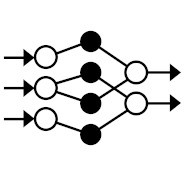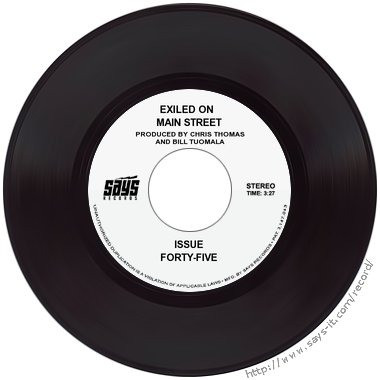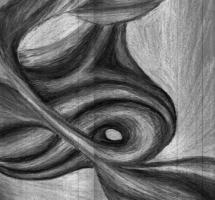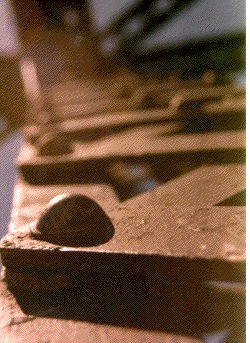Copy Link
Add to Bookmark
Report
Neuron Digest Volume 10 Number 16

Neuron Digest Saturday, 7 Nov 1992 Volume 10 : Issue 16
Today's Topics:
educational stock market game
Clinical and Research Positions at the VA GRECC(Salt Lake City)
position offer from RIKEN
"Help!!" - protein structures and fault diagnosis
Neural Nets and Visual tracking?
faculty positions (U Mass)
faculty position (Bristol, UK)
Connectionist Models Summer School 1993
New version of Self-Organizing Maps PD program package
Send submissions, questions, address maintenance, and requests for old
issues to "neuron-request@cattell.psych.upenn.edu". The ftp archives are
available from cattell.psych.upenn.edu (130.91.68.31). Back issues
requested by mail will eventually be sent, but may take a while.
----------------------------------------------------------------------
Subject: educational stock market game
From: Lawrence Davenport III <ld37@cunixa.cc.columbia.edu>
Date: Sat, 24 Oct 92 01:40:27 -0500
Dear "Neuron-Digest:
If you have an interest in the stock market, want to learn about
investment, want to receive some investment newsletters or
want to try out your investment skills, then please read on.
Otherwise, please hit the delete key now.
1. THE EVENT - WALL STREET INVESTMENT CHALLENGE:
The Wall Street Investment Challenge is a contest in which each
participant manages a fictional account of $1,000,000 in the stock
market. During the 3 months contest, each participants will
receive various top-rated investment newsletters. The winners of
the contest will receive a set of prizes ranging from $25,000 to $100.
2. THE EDUCATIONAL ASPECT
In addition to the fun and excitement that are associated with an investment
challenge, the Wall Street Investment Challenge has created a three facet
approach to help the participants to improve their investment skills.
A). Learning Of The Investment Principles
As a participant, you will receive 3 monthly issues of the Wall Street
Investment Review which reports the latest research findings in the
nation's best business schools on the subject of investment approaches
that have yielded high profit or low risk. All investment concepts are
explained in simple to understand language so that the readers can gain
immediate understanding and benefits.
B). Transforming The Investment Principles To Practical Stock Selection
You will also receive highly regarded investment newsletters, including
6 issues of Dow Theory Forecasts and 6 issues of The Cabot Market Letter.
Both of these two investment newsletters have been rated in the top 10,
out of hundreds of newsletters, in Hubert's Guide To The Investment
Newsletters. You can improve your ability to apply your investment
knowledge to actual stock selection by observing the practices of these
highly successful investment advisors.
C). Sharpen The Investment Instincts In The Real-Time Financial World
Many day to day financial and political developments have real impacts
on short term and long term stock investment. Hence, you can sharpen
your investment instincts by actively managing one or more portfolios
in the Wall Street Investment Challenge.
3. THE PRIZES
National Prizes:
The 20 portfolios with the highest balance at the end of the competition
will win the following cash prizes:
1st - 25,000 2nd - 4,000
3rd - 2,500 4th - 2,000
5th - 1,500 6th thru 20th - 1,000 each
Division Champion
Each participant is assigned to a division. Each division has 100
participants. At the end of the competition, the participant with the
highest portfolio value in the division will win the title of Division
Champion and will receive a $500 prize.
League Champion
If you and your friends register together with at least 10 portfolios,
you can form a league with a name of your choice. The best trader in
your league will win the title of the League Champion and will receive a
cash prize of $100.
4. OTHER INFO
Cost - $49.95 entry fee
Duration of the contest - from 11/1/92 to 1/31/93
Allowable trades - buy, sell and short all NYSE, AMEX and NASDAQ (OTC) stocks
To register or for more info, please call 1 (800) 964-6463, 24 hours a day,
7 days a week.
------------------------------
Subject: Clinical and Research Positions at the VA GRECC(Salt Lake City)
From: soller%asylum.cs.utah.edu@cs.utah.edu (Jerome Soller)
Organization: University of Utah CS Dept
Date: 25 Oct 92 00:55:44 +0000
I thought the following job posting would be of interest to researchers
in the neural network, biological models of aging, and intelligent
medical computing systems area. Some examples of research projects
at the VA GRECC in these areas include: applications of neural networks
to large database systems, application of neural networks to prediction
of heart disease(Charles Rosenberg), integrated data collection environments
using pen based computers(Steven Fehlauer), Semantic Networks(Judith
Graves), expert systems, etc.., to real problems in medicine and
nursing. Close ties exist between the GRECC and U. of Utah
Departments of Internal Medicine, Bioengineering, Computer Science,
Psychology, Medical Informatics, and Nursing Informatics. Another
separate VA center in Utah(VA Regional Information Systems Center,
one of 7 in the U.S.) provides access to the VA's DHCP database,
which is a standard database for 172 VA hospitals.
Sincerely,
Jerome Soller
VA GRECC
Ph.D. Candidate, U. of Utah
Department of Computer Science
soller@cs.utah.edu
- -------------------------------------------------------------------------
The Salt Lake City Geriatric Research, Education and Clinical Center
(GRECC) and the University of Utah School of Medicine are recruiting
individuals to join the VA/University program in Geriatric Internal
Medicine. University faculty rank is dependent on qualifications.
Candidates must hold an M.D. and/or Ph.D. and have interest in one or
more of the following:
Clinical Geriatric Internal Medicine
Basic Biological Mechanisms of Aging
Computer-based Strategies for "Real-Time" Assistance in
the Delivery of Health Care
Appointments will be in the SLC VAMC GRECC and in the appropriate
University of Utah academic department.
Send curriculum vitae and bibliography to:
Gerald Rothstein, M.D.
SLC GRECC (182)
500 Foothill Blvd.
SLC, UT 84148
Closing date March 31, 1993 or until suitable candidates are identifie
d.
Please call 801-582-1565 ext 4161 for further information.
The Department of Veterans Affairs and the University of Utah are
AA/EEO Employers.
C. Steven Fehlauer, M.D.
GRECC Research Investigator
Assistant Professor of Medicine
University of Utah
Charles Rosenberg, Ph.D.
GRECC Research Investigator
------------------------------
Subject: position offer from RIKEN
From: Takayuki Ito <itot@strl.nhk.or.jp>
Date: Mon, 26 Oct 92 10:38:11 +0200
I am Ito in NHK(Japan Broadcasting Corporation). Dr. Tanaka
in RIKEN Institute asked me to post this letter.
For more details, please contact with him by telephone or fax.
- ------------------------------------
Offer of a position for public subscription
RIKEN Institute, Information Science Laboratory
Researcher
Field: Physiological, anatomical, and psychological studies
of higher brain functions, and development of related
methodology.
Available from April 1, 1993
Condition: Ph.D or scheduled by April 1, 1993. No elder
than 34 on February 1, 1993. Any nationality.
Inquires to Dr. Keiji Tanaka, Chief of Information Science
Laboratory,
fax: +81-48-462-4696, tel: +81-48-462-1111 ext.6411
- ------------------------------------
----------------------------------------------
Takayuki Ito (itot@strl.nhk.or.jp)
NHK Science and Technical Research Labs.
1-10-11, Kinuta, Setagaya-ku, Tokyo 157 Japan
Tel.+81-3-5494-2369, Fax.+81-3-5494-2371
----------------------------------------------
------------------------------
Subject: "Help!!" - protein structures and fault diagnosis
From: VEMURI@icdc.llnl.gov
Date: Tue, 27 Oct 92 14:35:00 -0800
Help!!
I am getting interested in looking into the applications of neural nets
1. to protein structure problems.
2. to fault diagnosis (in electromechanical systems)
I have seen several times discussion about these two topics in these columns.
At that time I wasn't interested. NOW I AM!!
Can any one help with some bibliography material on these two topics.
Thanks you
V. Vemuri
Dept. of Applied Science
University of California
Livermore, CA 94550
"Vemuri@icdc.llnl.gov"
------------------------------
Subject: Neural Nets and Visual tracking?
From: Denis Mareschal <maresch@ox.ac.uk>
Date: Wed, 28 Oct 92 15:20:47 +0000
Hi,
I'm looking for references on the application of Neural-networks
to visual-tracking. In particular, the ability to predict or anticipate
futur positions based on information about the current history of the
trajectory as well as THE DEVELOPMENT of this ability.
I'm not very familiar with the vision literature but a preliminary
search hasn't turned anything up. I am aware of NN applications to
time-series analysis but I would prefer to find work dealing more
explicitly with vision.
Any help would be greatly appreciated and of course a list of
references will be compiled and posted if sufficient requests are made.
Thanks a lot
Cheers,
Denis Mareschal
Department of Psychology
Oxford
maresch@ox.ac.uk
------------------------------
Subject: faculty positions (U Mass)
From: Andy Barto <barto@cs.umass.edu>
Date: Fri, 30 Oct 92 18:53:42 -0500
UNIVERSITY OF MASSACHUSETTS
AMHERST
Faculty and Research Scientist Positions
The Department of Computer Science invites applications for one-three
tenure-track faculty positions at the assistant and associate levels and several
research-track faculty and postdoctoral positions at all levels, in all areas of
computer science. Applicants should have a Ph.D. in computer science or related
area and should show evidence of exceptional research promise. Senior level
candidates should have a record of distinguished research. Salary is
commensurate with education and experience. Our Department has grown
substantially over the past five years and currently has 30 tenure-track faculty
and 8 research faculty, approximately 10 postdoctoral research scientists, and
160 graduate students. Continued growth is expected over the next five years.
We have ongoing research projects in robotics, vision, natural language
processing, expert systems, distributed problem solving, machine learning,
artificial neural networks, person-machine interfaces,
distributed processing, database systems, information retrieval, operating
systems, object-oriented systems, persistent object management, real-time
systems, real-time software development and analysis, programming languages,
computer networks, theory of computation, office automation, parallel
computation, computer architecture, and medical informatics (with the UMass
Medical School). Send vita, along with the names of four references to Chair of
Faculty Recruiting, Department of Computer Science, University of Massachusetts,
Lederle Graduate Research Center, Amherst, MA 01003 by February 1, 1993 (or
Email inquiries can be sent to facrec@cs.umass.edu).
An Affirmative Action/Equal Opportunity Employer
------------------------------
Subject: faculty position (Bristol, UK)
From: I C G Campbell <C.Campbell@bristol.ac.uk>
Date: 02 Nov 92 15:04:01 +0000
FACULTY POSITION
UNIVERSITY OF BRISTOL, UNITED KINGDOM
Department of Computer Science
Applications are invited for a Lectureship in Computer Science now
tenable.
FURTHER PARTICULARS
The Department is part of the Faculty of Engineering. It has a
complement of eighteen full-time UFC-funded staff members,
together with a further twelve full-time outside-funded staff, and
two Visiting Industrial Professors: Professor J. M. Taylor
(Director, Hewlett-Packard Research Laboratories, Bristol) and
Professor I. M. Barron. There are three Professors in the
Department: Professor M. H. Rogers, who is Head of Department, and
Professors J. W. Lloyd and D. H. D. Warren.
The Department has substantial research funding from ESPRIT, SERC,
industry and government.
The Department concentrates its research in three main areas:
Logic Programming
Parallel Computing
Machine Intelligence
although a number of other topics are also being pursued.
For this appointment, we are looking for a strong candidate in any
area of Computer Science, although preference will be given to
candidates with research interests in Parallel Computing or
Machine Intelligence. We are particularly looking for candidates
whose interests will broaden and complement our current work in
these areas.
Current work in Parallel Computing covers a range of areas,
including parallel logic programming systems and languages, memory
organisation for multiprocessor architectures, shared data models
for transputer-based systems, and parallel applications especially
for engineering problems and computer graphics. We are seeking to
broaden and strengthen this research. Candidates with a strong
background in computer architecture would be particularly welcome.
Current work in Machine Intelligence centres mainly on Computer
Vision and Speech Processing. One major project in Computer
Vision is the development of an autonomous road vehicle, based on
real-time image analysis. Other research projects in Computer
Vision include vehicle number plate decoding, aircraft engine
inspection, and visual flow monitoring. Current work on Speech
Processing within the Department concentrates on speech synthesis,
but the Faculty supports a Centre for Communications Research
within which there is a Speech Research Group incorporating
researchers in most aspects of speech technology, including speech
recognition, speech coding, speech perception, and the design of
speech interfaces. There is an interest in neural network theory
and neural computing elsewhere in the Faculty and we would welcome
applications from candidates in this area.
The Department has a flourishing undergraduate and post-graduate
teaching programme and participates in degree programmes in the
Engineering, Science and Arts Faculties. These programmes lead
to B.Sc. degrees in Computer Science, and Computer Science with
Mathematics, a B.Eng. in Computer Systems Engineering, a B.A. in
Computer Science and a Modern Language, and M.Sc. degrees in
Computer Science, Foundations of Artificial Intelligence, and
Information Engineering.
The salary will be within the Lecturer Scale and the initial
placement will depend on age, qualifications and experience.
The closing date for applications is 27th November 1992.
Further particulars may be obtained from the Head of the Computer
Science Department (tel: 0272-303584; or e-mail:
barbara@bristol.uk.ac.compsci).
------------------------------
Subject: Connectionist Models Summer School 1993
From: "Michael C. Mozer" <mozer@dendrite.cs.colorado.edu>
Date: Mon, 02 Nov 92 14:35:14 -0700
CALL FOR APPLICATIONS
CONNECTIONIST MODELS SUMMER SCHOOL
University of Colorado
Boulder, Colorado
June 21 - July 3, 1993
The University of Colorado will host the 1993 Connectionist
Models Summer School from June 21 to July 3, 1993. The purpose
of the summer school is to provide training to promising young
researchers in connectionism (neural networks) by leaders of the
field and to foster interdisciplinary collaboration. This will
be the fourth such program in a series that was held at
Carnegie-Mellon in 1986 and 1988 and at UC San Diego in 1990.
Previous summer schools have been extremely successful and we
look forward to the 1993 session with anticipation of another
exciting event.
The summer school will offer courses in many areas of
connectionist modeling, with emphasis on artificial intelligence,
cognitive science, cognitive neuroscience, theoretical
foundations, and computational methods. Visiting faculty (see
list of invited faculty below) will present daily lectures and
tutorials, coordinate informal workshops, and lead small
discussion groups. The summer school schedule is designed to
allow for significant interaction among students and faculty. As
in previous years, a proceedings of the summer school will be
published.
Applications will be considered only from graduate students
currently enrolled in Ph.D. programs. About 50 students will be
accepted. Admission is on a competitive basis. Tuition will be
covered for all students, and we expect to have scholarships
available to subsidize housing and meal costs, which will run
approximately $300.
Applications should include the following materials:
* a one-page statement of purpose, explaining major areas of
interest and prior background in connectionist modeling and
neural networks;
* a vita, including academic history, publications (if any), and
a list of relevant courses taken with instructors' names and
grades received;
* two letters of recommendation from individuals familiar with
the applicants' work; and
* if room and board support is requested, a statement from the
applicant describing potential sources of financial support
available (department, advisor, etc.) and the estimated extent of
need. We hope to have sufficient scholarship funds available to
provide room and board to all accepted students regardless of
financial need.
Applications should be sent to:
Connectionist Models Summer School
c/o Institute of Cognitive Science
Campus Box 344
University of Colorado
Boulder, CO 80309
All application materials must be received by March 1, 1993.
Decisions about acceptance and scholarship awards will be
announced April 15. If you have additional questions, please
write to the address above or send e-mail to
"cmss@cs.colorado.edu".
Organizing Committee
Jeff Elman (UC San Diego)
Mike Mozer (University of Colorado)
Paul Smolensky (University of Colorado)
Dave Touretzky (Carnegie-Mellon)
Andreas Weigend (Xerox PARC and University of Colorado)
Additional faculty will include:
Andy Barto (University of Massachusetts, Amherst)
Gail Carpenter (Boston University)
Jack Cowan (University of Chicago)
David Haussler (UC Santa Cruz)
Geoff Hinton (University of Toronto)
Mike Jordan (MIT)
John Kruschke (Indiana University)
Jay McClelland (Carnegie-Mellon)
Steve Nowlan (Salk Institute)
Dave Plaut (Carnegie-Mellon)
Jordan Pollack (Ohio State)
Dave Rumelhart (Stanford)
Terry Sejnowski (UC San Diego and Salk Institute)
------------------------------
Subject: New version of Self-Organizing Maps PD program package
From: lvq@cochlea.hut.fi (LVQ_PAK)
Date: Tue, 03 Nov 92 12:30:27 +0700
************************************************************************
* *
* SOM_PAK *
* *
* The *
* *
* Self-Organizing Map *
* *
* Program Package *
* *
* Version 1.2 (November 2, 1992) *
* *
* Prepared by the *
* SOM Programming Team of the *
* Helsinki University of Technology *
* Laboratory of Computer and Information Science *
* Rakentajanaukio 2 C, SF-02150 Espoo *
* FINLAND *
* *
* Copyright (c) 1992 *
* *
************************************************************************
Some time ago we released the software package "LVQ_PAK" for
the easy application of Learning Vector Quantization algorithms.
Corresponding public-domain programs for the Self-Organizing Map (SOM)
algorithms are now available via anonymous FTP on the Internet.
"What does the Self-Organizing Map mean?", you may ask --- See the
following reference, then: Teuvo Kohonen. The self-organizing map.
Proceedings of the IEEE, 78(9):1464-1480, 1990.
In short, Self-Organizing Map (SOM) defines a 'non-linear projection'
of the probability density function of the high-dimensional input data
onto the two-dimensional display. SOM places a number of reference
vectors into an input data space to approximate to its data set in an
ordered fashion.
This package contains all the programs necessary for the application
of Self-Organizing Map algorithms in an arbitrary complex data
visualization task.
This code is distributed without charge on an "as is" basis.
There is no warranty of any kind by the authors or by Helsinki
University of Technology.
In the implementation of the SOM programs we have tried to use as
simple code as possible. Therefore the programs are supposed to
compile in various machines without any specific modifications made on
the code. All programs have been written in ANSI C. The programs are
available in two archive formats, one for the UNIX-environment, the
other for MS-DOS. Both archives contain exactly the same files.
These files can be accessed via FTP as follows:
1. Create an FTP connection from wherever you are to machine
"cochlea.hut.fi". The internet address of this machine is
130.233.168.48, for those who need it.
2. Log in as user "anonymous" with your own e-mail address as password.
3. Change remote directory to "/pub/som_pak".
4. At this point FTP should be able to get a listing of files in this
directory with DIR and fetch the ones you want with GET. (The exact
FTP commands you use depend on your local FTP program.) Remember
to use the binary transfer mode for compressed files.
The som_pak program package includes the following files:
- Documentation:
README short description of the package
and installation instructions
som_doc.ps documentation in (c) PostScript format
som_doc.ps.Z same as above but compressed
som_doc.txt documentation in ASCII format
- Source file archives (which contain the documentation, too):
som_p1r2.exe Self-extracting MS-DOS archive file
som_pak-1.2.tar UNIX tape archive file
som_pak-1.2.tar.Z same as above but compressed
An example of FTP access is given below
unix> ftp cochlea.hut.fi (or 130.233.168.48)
Name: anonymous
Password: <your email address>
ftp> cd /pub/som_pak
ftp> binary
ftp> get som_pak-1.2.tar.Z
ftp> quit
unix> uncompress som_pak-1.2.tar.Z
unix> tar xvfo som_pak-1.2.tar
See file README for further installation instructions.
All comments concerning this package should be
addressed to som@cochlea.hut.fi.
************************************************************************
------------------------------
End of Neuron Digest [Volume 10 Issue 16]
*****************************************


















